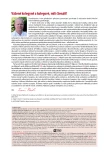Combined hormonal contraception in prevention of tumorous diseases
Authors:
Tomáš Fait
Authors‘ workplace:
Gynekologicko-porodnická klinika 1. lékařské fakulty UK a VFN v Praze, přednosta prof. MUDr. Alois Martan, DrSc.
Published in:
Prakt Gyn 2013; 17(2): 153-155
Category:
Oncogynecology: Review Article
Overview
Combined hormonal contraception has protective effect against ovarian cancer. It decreases by 30–50 %. Risk of endometrial cancer is lowering by 50–70 %. Strength of protection is positive related to length of combined contraception use. After ceasing oral contraception the primary preventive effect persists for minimally 20 years.
Key words:
colorectal carcinoma – endometrial carcinoma – hormonal contraception – ovarian carcinoma
Sources
1. Beral V, Doll R, Hermon C et al. Ovarian cancer and oral contraceptives: collaborative reanalysis of data from 45 epidemiological studies including 23,257 women with ovarian cancer and 87,303 controls. Lancet 2008; 371(9609): 303–314.
2. Vessey M, Painter R. Oral contraceptive use and cancer. Findings in a large cohort study, 1968–2004. Br J Cancer 2006; 95(3): 385–389.
3. Hannaford PC, Selvaraj S, Elliott AM et al. Cancer risk among users of oral contraceptives: cohort data from the Royal College of General Practitioner’s oral contraception study. Br Med J 2007; 335(7621): 651.
4. Narod SA, Risch H, Moslehi R et al.: Oral contraceptives and the risk of hereditary ovarian cancer. Hereditary Ovarian Cancer Clinical Study Group. N Engl J Med 1998; 339(7): 424–428.
5. McGuire V, Felberg A, Mills M et al. Relation of contraceptive and reproductive history to ovarian cancer risk in carriers and noncarriers of BRCA1 gene mutations. Am J Epidemiol 2004; 160(7): 613–618.
6. Whittemore AS, Balise RR, Pharoah PD et al. Oral contraceptive use and ovarian cancer risk among carriers of BRCA1 or BRCA2 mutations. Br J Cancer 2004; 91(11): 1911–1915.
7. Modan B, Hartge P, Hirsh-Yechezkel G at al. Parity, oral contraceptives, and the risk of ovarian cancer among carriers and noncarriers of a BRCA1 or BRCA2 mutation. N Engl J Med 2001; 345(4): 235–240.
8. Tworoger SS, Fairfield KM, Colditz GA et al. Association of oral contraceptive use, other contraceptive methods, and infertility with ovarian cancer risk. Am J Epidemiol 2007; 166(8): 884–901.
9. Ness RB, Grisso JA, Vergona R at al. Oral contaceptives, other methods of contraceptin, and risk reduction for ovarian cancer. Epidemiology 2001; 12(3): 307–312.
10. Ness RB, Rhiannon CD, Edwards RP et al. Contraception methods, beyond oral contraceprives and tubal ligation, and risk of ovarian cancer. Ann Epidemiol 2011; 21(3): 188–196.
11. Grimbizis GF, Tarlatzis BC. The use of hormonal contraception and its protective role against endometrial and ovarian cancer. Best Pract Res Clin Obstet Gyn 2010; 24(1): 29–38.
12. Cibula D, Widschwendter M, Majek O, Dusek L. Tubal ligation and the risk of ovarian cancer: review and metaanalysis. Hum Reprod Update 2011; 17(1): 55–67.
13. Schlesselman JJ. Risk of endometrial cancer in relation to use of combined oral contraceptives. Hum Reprod 1997; 12(9): 1851–1863.
14. Fernandez E, La Vecchia C, Balducci A et al. Oral contraceptives and colorectal cancer risk: a metaanalysis. Br J Cancer 2001; 84(5): 722–727.
Labels
Paediatric gynaecology Gynaecology and obstetrics Reproduction medicineArticle was published in
Practical Gynecology

2013 Issue 2
-
All articles in this issue
- Mediolateral episiotomy on right side or on left side?
- Repeated sectio caesarea, over and over: case report
- Myoinositol – new possibility in treatment of polycystic ovary syndrome
- Overactive bladder in the year 2013
- Periurethral agents in the treatment of urinary incontinence on the basis of the urethral sphincter insufficiency
- Complications after ovarian stimulation in vitro fertilization require admission to surgery
- Combined hormonal contraception in prevention of tumorous diseases
- New diagnostic tools in cervical cancer screening (ThinPrep Pap test)
- Bevacizumab in Treatment of Metastatic Breast Cancer: Case Report
- Global Consensus Statement on Menopausal Hormone Therapy
- Guidelines for the thyroid diseases diagnosis and management in pregnancy and women with fertility disorders
- Practical Gynecology
- Journal archive
- Current issue
- About the journal
Most read in this issue
- Repeated sectio caesarea, over and over: case report
- Guidelines for the thyroid diseases diagnosis and management in pregnancy and women with fertility disorders
- Complications after ovarian stimulation in vitro fertilization require admission to surgery
- Myoinositol – new possibility in treatment of polycystic ovary syndrome
